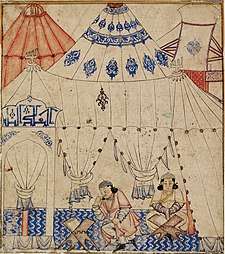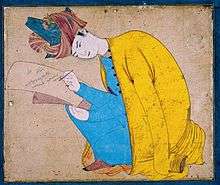Islamic studies
Islamic studies refers to the academic study of Islam. Islamic studies can be seen under at least two perspectives:[1]
- From a secular perspective, Islamic studies is a field of academic research whose subject is Islam as religion and civilization.
- From a traditional Islamic perspective, Islamic studies is an umbrella term for the "religious sciences" ('Ulum al-din, distinct from non-religious sciences such as mathematics, physics, chemistry, astronomy and philosophy), pursued by the ulama i.e. the Islamic scholarly class.
| Part of a series on |
| Islamic studies |
|---|
| Jurisprudence |
| Science |
| Arts |
| Architecture |
| Other topics |
| Part of a series on |
| Islam |
|---|
 |
|
Overview
Ulum al-din

In a Muslim context, Islamic studies is the umbrella term for the Islamic sciences (Ulum al-din), i.e. the traditional forms of religious knowledge and thought. These include kalam (Islamic theology) and fiqh (Islamic jurisprudence), Uṣūl al-Fiqh (methodology/principles of Jurisprudence), ḥadīth (traditions), ʿulūm al-ḥadīth (hadith criticism) naskh or al-nāsikh waʾl-mansūkh (abrogations), Usul al-Din (theology), Asma’ al-Rijal (biographies of Hadith scholars), Sirah (Biography (of the Prophet) and Maghazi (Battles of the Prophet).[2] (Studied in institutions in the Muslim world[3]
A subset of the Islamic sciences are `Ulum ul-Qur'an, (the sciences of the Quran), which include "how, where and when the Quran was revealed", and its transformation from an oral tradition to the written form, etc.[4] and Ilm ul-Tajwid (proper recitation), Ilm ul-Tafsir (exegesis of the Quran).[4] (In this context "science" is the translation of the Arabic term for "knowledge, learning, lore," etc.,[5] rather than "science" or natural science as commonly defined in English and other languages[6] -- i.e. the use of observation, testable explanations to build and organize knowledge and predictions about the natural world/universe[7][8][9] -- and is not to be confused with the scientific work of Muslims such as Avicenna or Nasir al-Din al-Tusi.
The religious sciences/Islamic studies "within Islamic civilization, ... began to take their present shape and to develop within competing schools to form a literary tradition in Middle Arabic" in Iraq in the ninth century CE, according to Oxford Islamic Studies.[10]
Islamic Studies in academia
In addition to the traditional Islamic sciences, Islamic Studies in the modern Muslim world incorporates more recent fields generally considered secular in the West, such as Islamic science and Islamic economics.
In a non-Muslim context, Islamic studies generally refers to an academic multidisciplinary "studies" program -- similar to other such programs (environmental studies, Middle East studies, race studies, urban studies, etc.)[11][12] -- where scholars from diverse disciplines (history, culture, literature, art) participate and exchange ideas pertaining to the particular field of study. (Although Western, academic Islamic studies itself is in many respects a self-conscious and self-contained field.) (According to one Muslim scholar, Hossein Nasr, the difference between traditional religious sciences and secular Islamic studies is that the Muslim sciences "provide all the answers to questions posed by modern western orientalists about the structure and text of the Koran, except, of course, those questions that issue from the rejection of the Divine Origin of the Koran", a rejection "usually hidden under the guise of rationality and objective scholarship. For Muslims there has never been the need to address these 'problems' ...")[13]
Such secular academic programs often include the historical study of Islam: Islamic civilization, Islamic history and historiography, Islamic law, Islamic theology and Islamic philosophy. Specialists in the discipline apply methods adapted from several ancillary fields, ranging from Biblical studies and classical philology to modern history, legal history and sociology. A recent trend, particularly since 9/11, has been the study of contemporary Islamist groups and movements by academics from the social sciences or in many cases by journalists, although since such works tend to be written by non-Arabists they belong outside the field of Islamic studies proper.
Scholars in the field of academic Islamic studies are often referred to as "Islamicists" and the discipline traditionally made up the bulk of what used to be called Oriental studies. In fact, some of the more traditional Western universities still confer degrees in Arabic and Islamic studies under the primary title of "Oriental studies". This is the case, for example, at the University of Oxford, where Classical Arabic and Islamic studies have been taught since as early as the 16th century, originally as a sub-division of Divinity. This latter context gave early academic Islamic studies its Biblical studies character and was also a consequence of the fact that throughout early-Modern Western Europe the discipline was developed by churchmen whose primary aim had actually been to refute the tenets of Islam.[14] Despite their now generally secular, academic approach, many non-Muslim Islamic studies scholars have written works which are widely read by Muslims, while in recent decades an increasing number of Muslim-born scholars have trained and taught as academic Islamicists in Western universities. Many leading universities in Europe and the US offer academic degrees at both undergraduate and postgraduate level in Islamic studies, in which students can also study Arabic and therefore begin to read Islamic texts in the original language. Because Arabic and Islamic studies are generally seen as inseparable in academia, named undergraduate degrees that combine the two are usually still categorized as single-subject degrees rather than as 'joint' or 'combined' degrees like, for example, those in Arabic and Politics. This rationale explains why, because of their heavy emphasis on the detailed study of Islamic texts in Classical Arabic, some institutions – such as the School of Oriental and African Studies (SOAS) in London and Georgetown University in Washington DC – only accept graduates who already have degree-level Arabic and a strong background in the academic study of Islam onto their Masters programmes in Islamic studies. Such institutions will generally direct students new to the field and with little or no Arabic to broader master's degrees in Middle Eastern studies or Middle East politics, in which Arabic can be studied ab initio.
A recent HEFCE report emphasises the increasing, strategic importance for Western governments since 9/11 of Islamic studies in higher education and also provides an international overview of the state of the field.[15]
History

.jpg)

The first attempt to understand Islam as a topic of modern scholarship (as opposed to a Christological heresy) was within the context of 19th-century Christian European Oriental studies.
In the years 1821 to 1850, the Royal Asiatic Society in England, the Société Asiatique in France, the Deutsche Morgenländische Gesellschaft in Germany, and the American Oriental Society in the United States were founded.[16]
In the second half of the 19th century, philological and historical approaches were predominant. Leading in the field were German researchers like Theodore Nöldeke 's study on the history of the Quran, or Ignaz Goldziher 's work on the prophetic tradition.[16]
Western orientalists and Muslim scholars alike preferred to interpret the history of Islam in a conservative way. They did not question the traditional account of the early time of Islam, of Muhammad and how the Quran was written.[16]
In the 1970s, the Revisionist School of Islamic Studies questioned the uncritical adherence to traditional Islamic sources and started to develop a new picture of the earliest times of Islam by applying the historical-critical method.[17][18]
Themes
History of Islam
To understand the history of Islam provides the indispensable basis to understand all aspects of Islam and its culture. Themes of special interest are:
Theology
Kalam (علم الكلام) is one of the "religious sciences" of Islam. In Arabic, the word means "discussion" and refers to the Islamic tradition of seeking theological principles through dialectic. A scholar of kalam is referred to as a mutakallim.
Mysticism
Sufism (تصوف taṣawwuf) is a mystic tradition of Islam based on the pursuit of spiritual truth as it is gradually revealed to the heart and mind of the Sufi (one who practices Sufism).
It might also be referred to as Islamic mysticism. While other branches of Islam generally focus on exoteric aspects of religion, Sufism is mainly focused on the direct perception of truth or God through mystic practices based on divine love. Sufism embodies a number of cultures, philosophies, central teachings and bodies of esoteric knowledge.
Law
Islamic jurisprudence relates to everyday and social issues in the life of Muslims. It is divided in fields like:
- the study of sharia law
- Islamic economics
- Qur'an and Hadith studies [19]
Key distinctions include those between fiqh, hadith and ijtihad.
Philosophy
Islamic philosophy is a part of Islamic studies. It is a longstanding attempt to create harmony between faith, reason or philosophy, and the religious teachings of Islam. A Muslim engaged in this field is called a Muslim philosopher.
It is divided in fields like:
- Early Islamic philosophy
- Islamic philosophy
- Modern Islamic philosophy
- List of Muslim philosophers
- Illuminationist philosophy
- Islamic ethics
- Sufi metaphysics
Sciences
Islam and science is science in the context of traditional religious ideas of Islam, including its ethics and prohibitions. A Muslim engaged in this field is called a Muslim scientist
This is not the same as science as conducted by any Muslim in a secular context. Certain liberal movements in Islam eschew the practice of Islamic science, arguing that science should be considered separate from religion as it is today in the West. As in Catholicism however, believers argue that the guiding role of religion in forming ethics of science cannot be ignored and must impose absolute constraints on inquiry.
- Qur'an and science
- Islamic creationism
Science in medieval Islam examines the full range of scientific investigation in the Muslim world, whether performed within a religious or secular context. Significant progress in science was made in the Muslim world during the Middle Ages, especially during the Islamic Golden Age, which is considered a major period in the history of science.
- Timeline of Islamic science and engineering
- Alchemy and chemistry in medieval Islam
- Astronomy in medieval Islam
- Islamic astrology
- Inventions in medieval Islam
- Mathematics in medieval Islam
- Medicine in medieval Islam
- Physics in medieval Islam
- Psychology in medieval Islam
Literature
This field includes the study of modern and classical Arabic and the literature written in those languages. It also often includes other modern, classic or ancient languages of the Middle East and other areas that are or have been part of, or influenced by, Islamic culture, such as Hebrew, Turkish, Persian, Urdu, Azerbaijanian and Uzbek.
Architecture
Islamic architecture is the entire range of architecture that has evolved within Muslim culture in the course of the history of Islam. Hence the term encompasses religious buildings as well as secular ones, historic as well as modern expressions and the production of all places that have come under the varying levels of Islamic influence.
It is very common to mistake Persian architecture for Islamic architecture.
Art
- Islamic calligraphy
- Islamic pottery
- Muslim music
Islamic visual art has, throughout history, been mainly abstract and decorative, portraying geometric, floral, Arabesque, and calligraphic designs. Unlike the strong tradition of portraying the human figure in Christian art, Islamic art is typically distinguished as not including depictions of human beings. The lack of portraiture is due to the fact that early Islam forbade the painting of human beings, especially the Prophet, as Muslims believe this tempts followers of the Prophet to idolatry. This prohibition against human beings or icons is called aniconism. Despite such a prohibition, depictions of human beings do occur Islamic art, such as that of the Mughals, demonstrating a strong diversity in popular interpretation over the pre-modern period. Increased contact with the Western civilization may also have contributed to human depictions in Islamic art in modern times.
Comparative religion
Islamic comparative religion is the study of religions in the view of Islam. This study may be undertaken from a conservative Muslim perspective, which often sees Judaism and Christianity as having been originally similar to Islam, and later developing away from the root monotheist religion. However, some liberal movements within Islam dispute the conservative view as being ahistorical; they claim that Islam is the end-result rather than the origin point of monotheist thought.
- Islam and Christianity
- Islam and Jainism
- Islam and Judaism
- Judeo-Islamic philosophies (800 - 1400)
Economics
Islamic economics is economics in accordance with Islamic law. Because the Qur'an spoke against usury in the context of early Muslim society, it generally entails trying to remove or redefine interest rates from financial institutions. In doing so, Islamic economists hope to produce a more "Islamic society". However, liberal movements within Islam may deny the need for this field, since they generally see Islam as compatible with modern secular institutions and law.
- Islamic banking
- Islamic economics in the world
Psychology
Islam and Modernity
An interesting field of study is how Islam reacts on the contact with Western modernity, and how Islam can catch up with modernity without betraying itself. These studies comprise Islamic history, Islamic theology, Islamic Mysticism, and Islamic philosophy, as well as the study of Western philosophy, sociology and politology.
- Al-Nahda
- Islam and modernity
- Liberal and Progressive Muslim movements
Journals
- Die Welt des Islams (Brill)
- Islamic Law and Society (Brill)
- Islam and Christian-Muslim Relations (Routledge)
- Jerusalem Studies in Arabic and Islam (The Max Schloessinger Memorial Foundation, The Hebrew University of Jerusalem)[20]
- Journal of Arabic and Islamic Studies open access (Lancaster University)
- Journal of Islamic Studies (Oxford University Press)
- Hakeem Al Hind (Sree Sankaracharya University of Sanskrit Kerala, India)[21]
- Al Mahara (Maharajas College, Kochin, India)
- The Muslim World (Blackwell Publishing)
- Studia Islamica (Maisonneuve & Larose)
- Pax Islamica (Mardjani Publishing House)
- Journal of Islam in Asia, International Islamic University Malaysia[22]
- Al-Qantara, Spanish National Research Council
See also
Secular perspective
- List of Islamic terms in Arabic
- Islamic studies by author (non-Muslim or academic)
Religious perspective
- The Islamic College
- Allamah
- Madrasah
- Muslim scholars
- List of Islamic studies scholars
References
- Clinton Bennett (2012). The Bloomsbury Companion to Islamic Studies. Bloomsbury Academic. p. 2. ISBN 978-1441127884.
- Beg, Muhammad Abdul Jabbar (30 August 2010). "The Origins of Islamic Science. 2.3. Unity of Knowledge: Religious, Rational and Experimental". Muslimheritage. Retrieved 7 March 2020.
- such as "Faculty of Islamic Sciences". Ankara Yildirim Beyazit University. Retrieved 7 March 2020.
- Ayatullah Jafar Subhani (2005). "Foreword". Introduction to the Science of Tafsir of the Quran. Lulu Press, Inc. Retrieved 28 November 2019.
- https://giftsofknowledge.files.wordpress.com/2016/01/hans-wehr-searchable-pdf.pdf Searcheable PDF of the Hans Wehr Dictionary
- Huff, Toby (2007). Islam and Science. Armonk, Ny: M.E. Sharpe, Inc. pp. 26–36. ISBN 978-0-7656-8064-8.
- Wilson, E.O. (1999). "The natural sciences". Consilience: The Unity of Knowledge (Reprint ed.). New York, New York: Vintage. pp. 49–71. ISBN 978-0-679-76867-8.
- "... modern science is a discovery as well as an invention. It was a discovery that nature generally acts regularly enough to be described by laws and even by mathematics; and required invention to devise the techniques, abstractions, apparatus, and organization for exhibiting the regularities and securing their law-like descriptions."— p.vii Heilbron, J.L. (editor-in-chief) (2003). "Preface". The Oxford Companion to the History of Modern Science. New York: Oxford University Press. pp. vii–X. ISBN 978-0-19-511229-0.
- "science". Merriam-Webster Online Dictionary. Merriam-Webster, Inc. Retrieved October 16, 2011.
3 a: knowledge or a system of knowledge covering general truths or the operation of general laws especially as obtained and tested through scientific method b: such knowledge or such a system of knowledge concerned with the physical world and its phenomena.
- "Islamic Studies". Oxford Islamic Studies. Retrieved 7 March 2020.
- Repko, Allen F.; Szostak, Rick; Buchberger, Michelle Phillips (2020). Introduction to Interdisciplinary Studies. SAGE publications. p. xx. Retrieved 28 November 2019.
- Dorroll, Courtney M., ed. (2019). Teaching Islamic Studies in the Age of ISIS, Islamophobia, and the Internet. Indiana University Press. p. 105. Retrieved 28 November 2019.
- Seyyed Hossein Nasr, ed. (1987 2008). Islamic Spirituality - Foundations. Routledge. p. 9, note 1. Retrieved 7 March 2020. Check date values in:
|year=(help) - Robert Irwin (25 January 2007). For Lust of Knowing: the Orientalists and their Enemies (1st ed.). Penguin. ISBN 978-0140289237.
- "Archived copy". Archived from the original on 2016-03-04. Retrieved 2018-12-28.CS1 maint: archived copy as title (link)
- The Oxford Encyclopedia of the Islamic World: Islamic Studies - History of the field, Methodology
- Alexander Stille: Scholars Are Quietly Offering New Theories of the Koran, The New York Times, 2 March 2002
- Toby Lester: What Is the Koran?, The Atlantic, January 1999
- Zayed, Tareq M. "Knowledge of Shariah and Knowledge to Manage 'Self' and 'System': Integration of Islamic Epistemology with the Knowledge and Education". Academia.edu. Retrieved 29 May 2018.
- "Sree Sankaracharya University of Sanskrit". Ssus.ac.in. Retrieved 29 May 2018.
- "Journal of Islam in Asia". Retrieved 30 April 2019.
Bibliography
- Azim Nanji, ed. (1997). Mapping Islamic Studies: Genealogy, Continuity and Change. Walter de Gruyter. ISBN 978-3-11-081168-1.
External links
Secular perspective
- Journal of Arabic and Islamic Studies
- Zwemer Center for Muslim Studies
- Islamic Studies Research Unit
- SOAS MA in Islamic Studies
- Institute of Islamic Studies at McGill University
- Article from The University of Chicago Chronicle
- Muslim Philosophy
- Digital Islam, research project on the Middle East, Islam and digital media.
- Jamia Millia Islamia, New Delhi
- Pakistaniaat: A Journal of Pakistan Studies
- Kraus-Meyerhof Offprints of Islamic Scholarship
Religious perspective
- Australian Islamic Library
- Monthly At-Tahreek, Bangladesh-based research journal on Tawheed and Saheeh (authentic) Sunnah.
- Islamic University Jamia Arabia Ahsan-Ul-Uloom
- College of Da’wa and Usul-ud-Din at Umm Al Qura University
- Oxford Centre for Islamic Studies
- MA degree in Islamic Studies through distance learning
- A history of Islamic culture
- Islamic Civilization
- Institute of Ismaili Studies
- Muslim Philosophy
- Portal for Islamic studies according to Quran and Sunnah per Ahl as Sunnah wal Jamah - Salaf as Salih
- Islamology site for Islamic References
- Online Islamic Studies